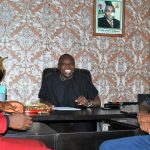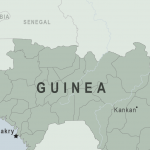Overlapping Functions Bane Of Security Challenges In Nigeria —Official
African News, Latest Headlines, News, News Across Nigeria, News From The State Friday, July 9th, 2021
(AFRICAN EXAMINER) – Prof. Abubakar Sulaiman, Director-General, National Institute for Legislative and Democratic Studies (NILDS), says overlapping functions remain a significant problem encountered by Nigerian security agencies.
Sulaiman said this during a National Security Legislative Reform Retreat for Leadership, Chairmen of Committees on Security and Sponsors of Security Bill of the House of Representatives on Friday in Lagos.
Sulaiman said that absence of robust intelligence gathering and analysis mechanism as well as overlapping functions remained a significant problem encountered by security agencies.
He noted that overlaps in function were often necessary and desirable but could lead to misunderstanding and outright conflict if not properly managed.
“Where there is synergy between agencies, they are better able to manage conflict, share resources and draw from the operational competencies of one another.
“Inter-agency collaboration can also reduce the strain on existing resources where every agency protects its turf and prepares its own budget independent of other agencies,” he said.
The director-general noted that to implement this effectively, the role of security agencies, particularly in joint operations, were clearly spelt out.
“It is important to delineate the role of ‘lead’ and ‘supporting agencies’ in such contexts.
“This is even more critical for agencies that are assigned ‘coordinating’ functions either by the constitution or other statutory instruments,” he said.
Sulaiman said that insights garnered from security personnel, government officials, legislators enriched the study and recommendations made on legislative measures and strategies for security sector reform.
According to him, Office of the Speaker, House Committee on Monitoring and Implementation of Legislative Agenda, NILDS and KAS, undertook a review of the national security framework, identified priority issues contained in the House Agenda.
He said that the outcome was the emergence of seven security-based bills.
Also, Mr Henry Nwawuba, Chairman, House Committee on Monitoring and Implementation of Legislative Agenda, said that the retreat would review the seven draft bills focused on addressing the statutory weaknesses of national security framework.
Nwawuba listed the drafts bills as Armed Forces Act (Amendment) Bill; Civil Defence Act (Amendment) Bill; Economic and Financial Crimes Commission Act (Amendment) Bil; and Police Act (Amendment) Bill.
He said that others include the Corrupt Practices and Other Related Offences Act (Amendment) Bill; Customs and Excise Management Act (Amendment) Bill.
Nwawuba also listed the ECOWAS Convention on Small Arms and Light Weapons, their Ammunition and Other Related Materials Act (Ratification and Enforcement) Bill, 2021.
Commenting, the Speaker, House of Representatives, Femi Gbajabiamila, said that the bills reflect the recommendations for legislative action made by security experts and policymakers at the recently concluded Special Summit on National Security.
Gbajabiamila, represented by Mr Tobe Okechukwu, Deputy Minority Leader, House of Representatives, said that the house would collaborate to rapidly advance the reform proposals through legislative process.
The speaker said that the house would do that in cognisance that the bills would ensure that the country defeat the forces of violence and strife that challenge and threaten its peaceful prosperity.
Also, Dr Vladimir Kreck, Resident Representative, KAS, said that only a joint and collaborative approach would assist to tackle the security challenges in the country.
Kreck said that to overcome rivalry between agencies and induce synergies, a regulatory framework was necessary to define the modes of collaboration.
He said that the retreat was to deepen the knowledge of participants about the legislative intention of the reforms, and illustrate how the bills were interlinked before being referred to respective committees for deliberation.
Kreck expressed optimism that the retreat would be a decisive step toward a more effective security sector and more democratic governance in Nigeria.
The retreat was organised by NILDS, Office of the Speaker of the House of Representatives, the House Committee on Monitoring and Implementation of the Legislative Agenda and the Konrad Adenauer Stiftung Foundation (KAS).
The News Agency of Nigeria (NAN) reports that KAS is a German political foundation, funded by the German Foreign Office, and has been supporting security sector reform in Nigeria since 2016. (NAN)
Related Posts
Short URL: https://www.africanexaminer.com/?p=65273




















